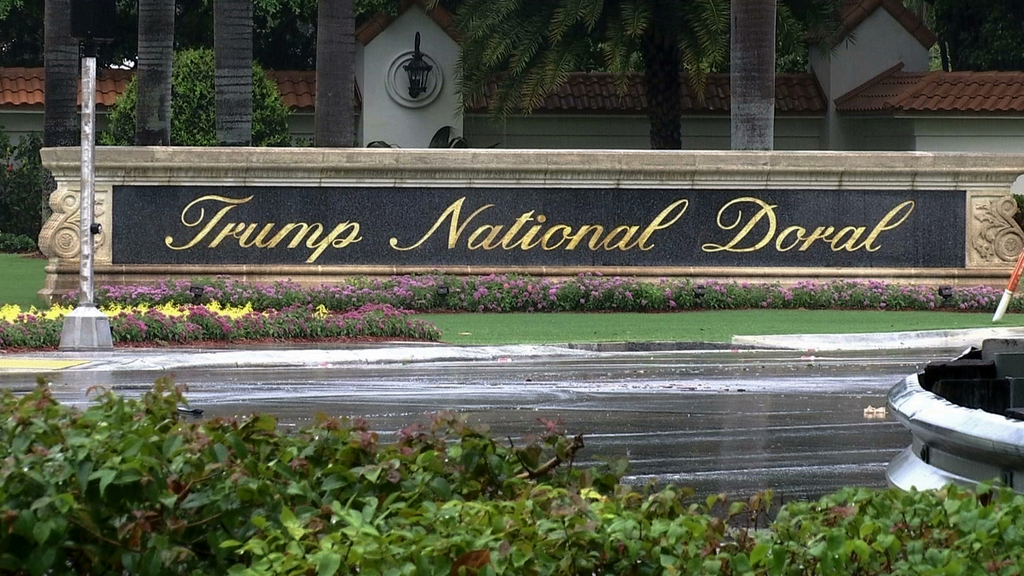[ad_1]
By Zeke Miller and Jill Colvin, The Associated Press
President Donald Trump dropped plans to hold an international summit at his Doral resort in Florida after realizing “it looks lousy” to steer business to his own property, his acting chief of staff said Oct. 20.
Mick Mulvaney said Trump was “honestly surprised by the level of pushback” against his choice of Doral for next year’s Group of Seven gathering.
He added in an interview on “Fox News Sunday” that Trump “still considers himself to be in the hospitality business” and “wanted to put on the absolute best show.”

But he added: “I think he knows, people think it looks lousy.”
Trump announced a rare backtrack Saturday night after facing accusations that he was using the presidency to enrich himself by hosting the international summit at the private resort owned by his family.
“Based on both Media & Democrat Crazed and Irrational Hostility, we will no longer consider Trump National Doral, Miami, as the Host Site for the G-7 in 2020,” Trump tweeted. He said his administration “will begin the search for another site, including the possibility of Camp David, immediately.”
The striking reversal raises further doubts about Mulvaney’s future in the chief of staff job. He held a news conference Oct. 17 announcing the choice of Doral for the summit. He insisted his staff had concluded it was “far and away the best physical facility.” Mulvaney said the White House reached that determination after visiting 10 sites across the country.
Days after being the face of the selection, Mulvaney again held a national stage, but this time said: “I think it’s the right decision to change.”
At the news conference Oct. 17, Mulvaney acknowledged a quid pro quo was at work when Trump held up U.S. aid to Ukraine in exchange for Ukraine’s investigation of Democrats and the 2016 elections. Mulvaney later claimed his comments had been misconstrued, but not before drawing the ire of the president and frustration from other senior aides.
Trump had been the first administration official to publicly float the selection of his property to host the summit when in August he mentioned it was on the shortlist and praised its facilities and close proximity to Miami’s international airport.
His comments, more than a month before the announcement, drew instant criticism from good-governance groups and Democrats, who said it raised concerns that Trump was using the White House to boost his personal finances.
The vociferous criticism only intensified with Thursday’s announcement, drawing wide condemnation from Democrats and even some Republicans. Trump insisted he would host the summit at cost, though he refused to disclose financial details. The annual heads-of-state gathering would at minimum have provided goodwill value to his property.
The Trump Organization did not respond to an e-mailed request Oct. 18 seeking details on how it would calculate its charges to the federal government, such as whether it would include the full cost of upgrades to buildings that could benefit the resort for years to come.
Noah Bookbinder, executive director of Citizens for Responsibility and Ethics in Washington, said Trump’s reversal Saturday “is a bow to reality, but does not change how astonishing it was that a president ever thought this was appropriate, or that it was something he could get away with.”
On Oct. 17, Mulvaney had discounted Camp David, the government-owned presidential retreat, as the site for the summit, claiming, “I understand the folks who participated in it hated it and thought it was a miserable place to have the G-7.” He added that it was too small and remote for the international summit.
Mulvaney listed more than a half dozen states visited in the screening, including Tennessee, North Carolina, Hawaii and Utah. But convention, economic development and tourism officials in several of those states said they were unaware of any visits, and some didn’t even know their state was in the running.
The governor’s office in Hawaii said a “general search” had been done, but didn’t think any specific site had been considered. In Utah, where Mulvaney said two places had made a final list of four sites, the governor’s office said it was not aware any venue there was under serious consideration.
___
Associated Press writer Bernard Condon in New York contributed to this report
[ad_2]
Source link

